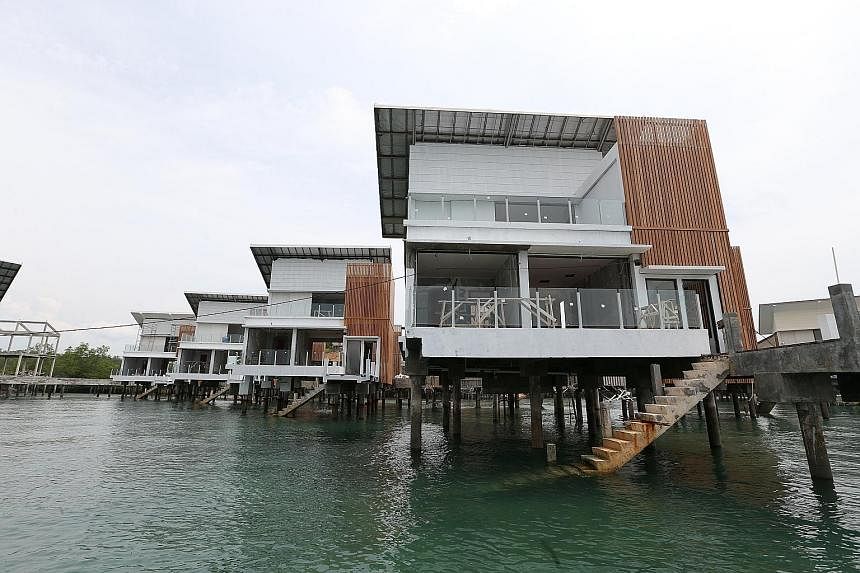LAST month, the Monetary Authority of Singapore (MAS) warned that Singaporeans were snapping up foreign properties without recognising the risks involved in these purchases.
The central bank said in a reply to a parliamentary question that it will continue to work with the Council of Estate Agents (CEA) to step up efforts to help Singaporeans better understand the risks of investing in foreign properties.
Besides public education, the MAS and CEA ought to also level the playing field in how local and foreign properties are sold here.
Most of the rules that local developers have to meet when they sell their properties in Singapore do not apply to foreign developers. The bar is lower for foreign developers in at least four areas.
The first is financing rules.
The property financing caps that the MAS imposes on the purchase of local properties are easily circumvented when foreign developers offer offshore financing.
At a London property launch which I attended last month, the local marketing agent lined up a local banker and a Hong Kong- based wealth manager to lay out the financing options.
"It is better to go for the overseas loan if you are going to breach the MAS total debt servicing ratio," said the saleswoman licensed by the CEA.
I wonder if she understood the implications of her pitch.
While offshore financing is perfectly legitimate, things get murkier when the developers offer in-house financing.
For example, an Indonesian developer selling villas being built near Batam in a lagoon with dolphins was offering buyers the option of paying a final instalment of $300,000 in a lump sum or in monthly instalments of $5,980 over five years, which works out to be about 7.3 per cent in annual interest.
The developer insisted that it was not a financing plan, but an "easy payment plan".
Whatever foreign developers choose to call them, they are clearly meant to help buyers get around MAS' total 60 per cent loan cap or total debt servicing ratio. It goes against the spirit of financing rules meant to help Singaporeans avoid being over- stretched in debt.
Such moves ought to be stopped.
Besides financing, foreign developers also do not have to comply with rules set by the Urban Redevelopment Authority (URA) on how projects are marketed here.
The URA has, since 2012, required developers selling local properties to give more information in writing to buyers on the project and unit before the option to purchase is issued.
There is also the "what you see is what you get" requirement where developers must provide drawn-to-scale location and site plans, including giving a unit floor plan and a breakdown of a unit's floor area by spaces such as bedrooms and balconies.
Experienced foreign developers will not have difficulties meeting such requirements should they be imposed. For example, I picked up a 72-page hardcover book on a United Kingdom project and detailed plans of a project in Japan at their launches last month.
Although such requirements can prevent and deter less than reputable foreign developers from hawking their projects in Singapore, they are not a bad thing.
Apart from marketing, a third area that worries me has got to do with advertising.
Last month, the Indonesian developer behind the Batam dolphin villas splashed full-page advertisements of the villas "16km from Sentosa" showing dolphins leaping out of the water and the Marina Bay Sands skyline on the horizon.
Nowhere in the advertisements did it say that the project is in Indonesian waters. The only clue is the developer's name - PT Batam Island Marina - in fine print.
Shortly after the story was published, advertising watchdog the Advertising Standards Authority of Singapore (Asas) said it was working with the MAS and CEA to review how the Singapore advertising code applies to foreign developers. This cannot come a day too soon.
A check of six overseas property advertisements in The Straits Times and The Sunday Times over the last weekend found that only one local marketing agent warned buyers of the risks.
"All foreign property investments carry risk. You should hire your own professional advisers to investigate the property and any related or ancillary purpose," warned CBRE in an ad marketing a Johor property.
The review by Asas should ensure that those selling foreign properties make as much effort warning buyers of the risks as they ringfence to protect themselves should things turn sour.
And lastly, I was surprised by how easy it is for a foreigner or foreign firm to sell its properties in Singapore without any regulatory oversight.
Of the six properties launched last weekend, two were from Australian developers selling directly to Singapore buyers. They did not use local agents, which meant that buyers would not have been afforded an extra layer of due diligence the local agent would been presumed to have conducted before undertaking to market a project.
There is no requirement for foreign developers to sell their properties through local agents. But even so, those that choose to conduct their own sales ought to be required to meet the same standards expected of local agents.
The CEA said the law exempts foreign developers selling properties directly from its own rules.
This exclusion does not make sense. After all, the CEA should be regulating the activity of property sales, regardless of whether agents or developers conduct the sales.
Mr Ku Swee Yong, chief executive of estate agency Century 21, said that foreign developers having to meet fewer rules has a direct impact on the sector.
"The playing field is uneven," he said, adding: "The only rule that binds foreign developers is advertising and, even so, Asas lacks the teeth to enforce."
If the Government is worried about Singaporeans pouring money into foreign properties, as it appears to be, then it has to even the playing field.
And it can start by making sure that the rules on advertising, financing and information disclosure apply equally to all developers selling properties here.
This would ensure that foreign firms do not have an easier ride persuading property-obsessed Singaporeans from parting with their hard-earned cash to buy properties in far-flung places.
It would also minimise the possibility of heartache if such investments fail.


